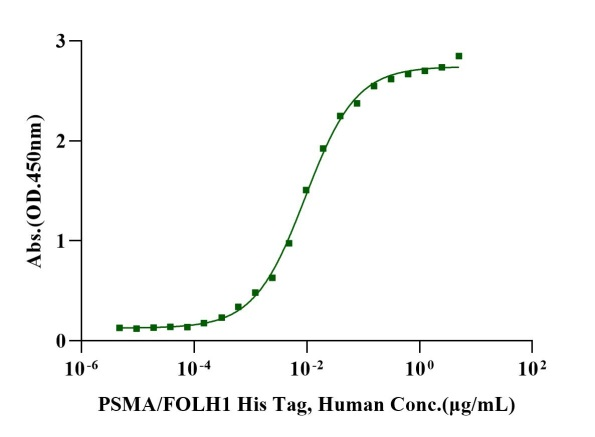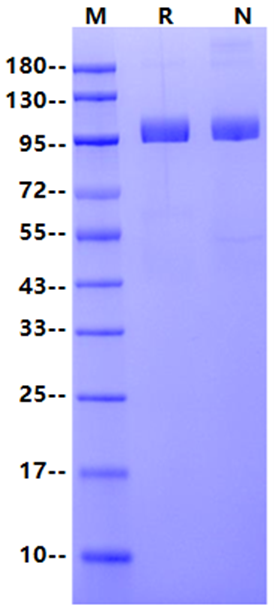Lys44-Ala750, with N-terminal 10*His HHHHHHHHHHGGGSGGGSKSSNEATNITPKHNMKAFLDELKAENIKKFLYNFTQIPHLAGTEQNFQLAKQIQSQWKEFGLDSVELAHYDVLLSYPNKTHPNYISIINEDGNEIFNTSLFEPPPPGYENVSDIVPPFSAFSPQGMPEGDLVYVNYARTEDFFKLERDMKINCSGKIVIARYGKVFRGNKVKNAQLAGAKGVILYSDPADYFAPGVKSYPDGWNLPGGGVQRGNILNLNGAGDPLTPGYPANEYAYRRGIAEAVGLPSIPVHPIGYYDAQKLLEKMGGSAPPDSSWRGSLKVPYNVGPGFTGNFSTQKVKMHIHSTNEVTRIYNVIGTLRGAVEPDRYVILGGHRDSWVFGGIDPQSGAAVVHEIVRSFGTLKKEGWRPRRTILFASWDAEEFGLLGSTEWAEENSRLLQERGVAYINADSSIEGNYTLRVDCTPLMYSLVHNLTKELKSPDEGFEGKSLYESWTKKSPSPEFSGMPRISKLGSGNDFEVFFQRLGIASGRARYTKNWETNKFSGYPLYHSVYETYELVEKFYDPMFKYHLTVAQVRGGMVFELANSIVLPFDCRDYAVVLRKYADKIYSISMKHPQEMKTYSVSFDSLFSAVKNFTEIASKFSERLQDFDKSNPIVLRMMNDQLMFLERAFIDPLGLPDRPFYRHVIYAPSSHNKYAGESFPGIYDALFDIESKVDPSKAWGEVKRQIYVAAFTVQAAAETLSEVA
1、Su S L. et al. (1995) Alternatively spliced variants of prostate-specific membrane antigen RNA: ratio of expression as a potential measurement of progression.Cancer Res. 55: 1441-1443.
2、O'Keefe D S. et al. (1998) Mapping, genomic organization and promoter analysis of the human prostate-specific membrane antigen gene.Biochim. Biophys. Acta 1443: 113-127.
PSMA is a transmembrane protein present in all prostatic tissues. Increased PSMA expression is seen in several malignancies, although prostate cancer is the tumour where it presents higher concentrations. Almost all prostate adenocarcinomas show PSMA expression in most of lesions, primary and metastatic. Immunohistochemistry has demonstrated that the expression of PSMA increases in patients with de-differentiated, metastatic or hormone-refractory tumours. Moreover, the expression level of PSMA has a prognostic value for disease outcome.

Immobilized Anti-Human PSMA Monoclonal Antibody at 2μg/mL (100μL/well) can bind PSMA/FOLH1 His Tag, Human (Cat. No. UA010291) with EC50 of 8.48-10.42ng/ml.
